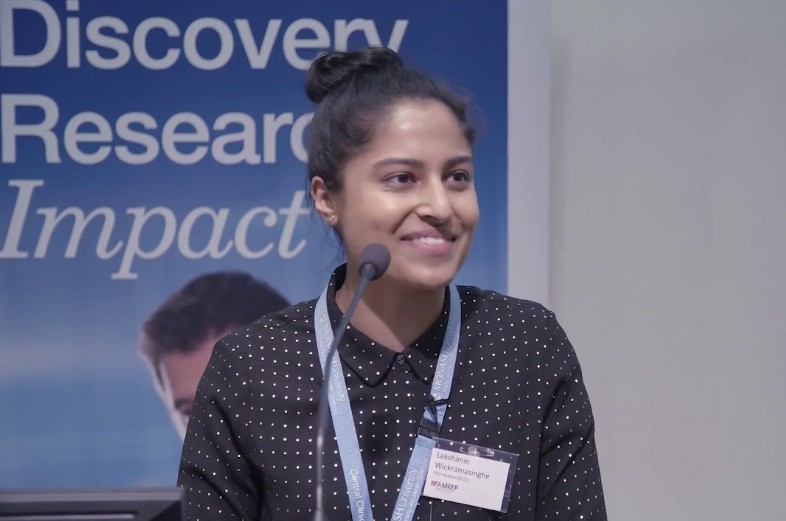ENCOURAGEMENT AWARD WINNERS MARCH 2020
ATA Scientific would like to thank all those that participated in our March 2020 Encouragement Award promotion.
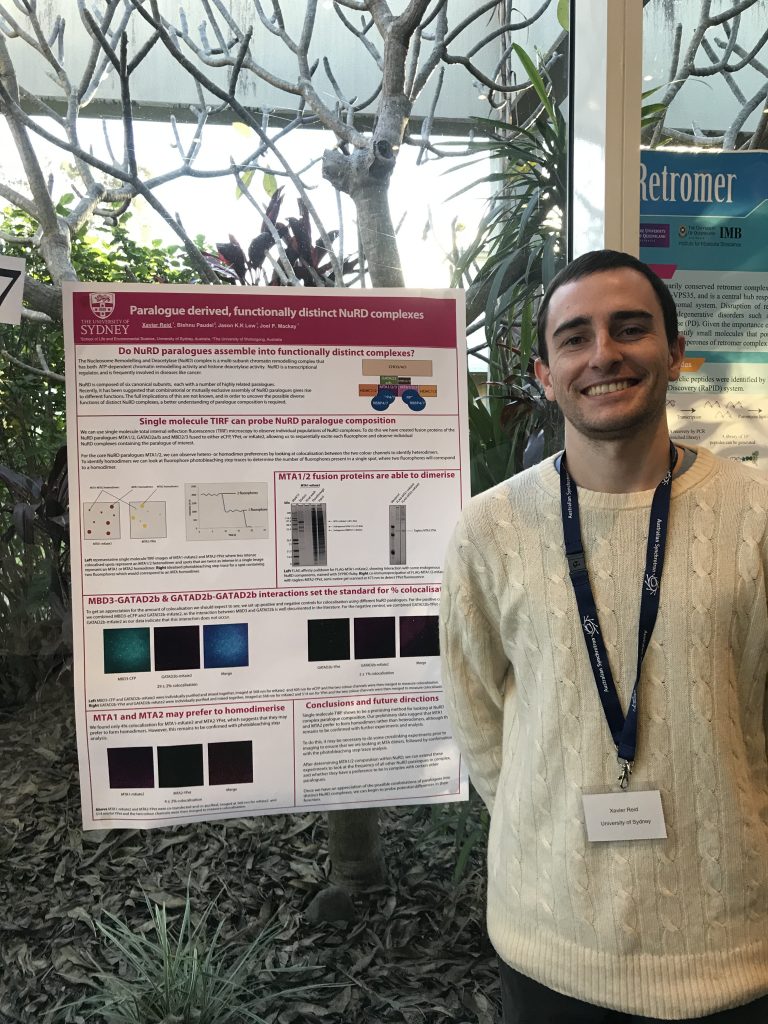
The topic of our latest competition asked the question “Should intelligent robots have the same rights and freedoms that we have?” As robots develop more advanced artificial intelligence empowering them to think and act like humans, do our legal standards need to change? Some of our participants argued that only those who have living and independently viable human bodies are worthy of moral consideration. Others raised concerns with the advent of ‘deep learning’ and the use of algorithms by their creators as a covert way to absolve themselves of responsibility. Some believe a potential AI takeover is imminent where robots will become “an existential threat” to humans – just like in the movies I,Robot and The Terminator. So, by giving AI full human rights, are we quite literally handing AI the key to our own doom? Only the future holds the answers.…
OUR WINNERS
Three entries were selected to receive our award– first prize at $1500 and 2 runners up at $600 each.
Congratulations to our first prize winner, Xavier John Reid, PhD student at the University of Sydney, School of Life and Environmental Sciences working under the supervision of Prof. Joel Mackay.
“I would like to be able to contribute to society as much as possible, and for me the way of doing this that makes the most sense is through research”.
The broad focus of Xavier’s project involves looking into how chromatin remodelling leads to certain genes being turned on or off. In particular, how chromatin remodelling complexes like the Nucleosome Remodelling and Deacetylase complex achieve substrate specificity through a combination of switching out paralogous subunits, and recognition of particular post translational modifications on histone proteins. Ultimately this will allow better understanding of how aberrant behaviour of these complexes leads to a variety of diseases.
Xavier plans to use his prize to attend either Lorne Proteins 2021 or ComBio 2022 depending on the COVID-19 situation, where he can learn more about the wider fields surrounding his project.
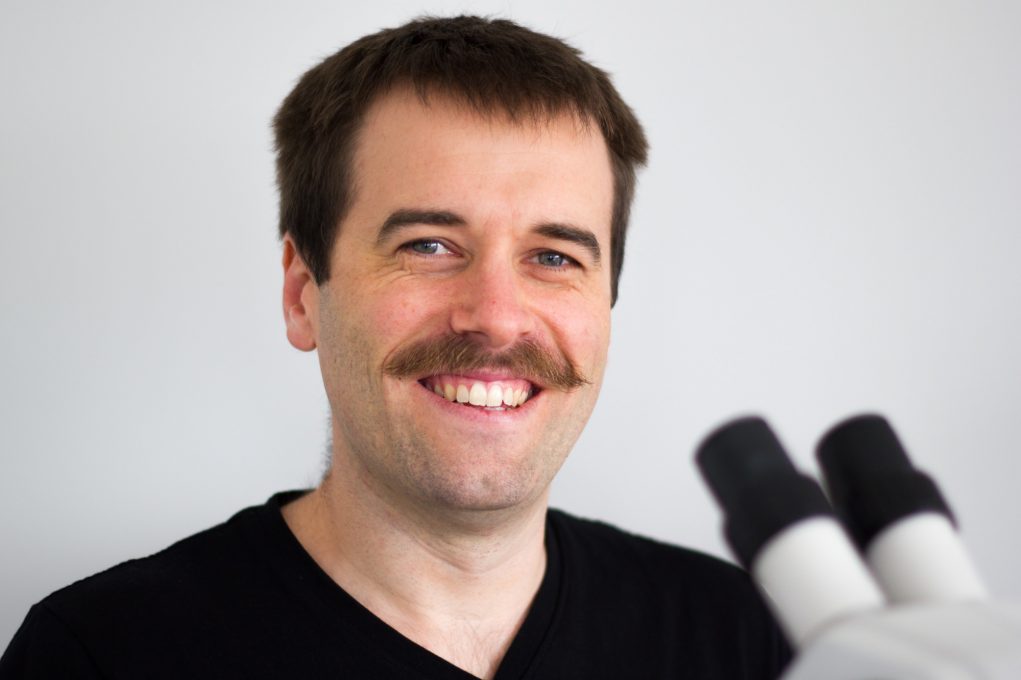 Congratulations to our runner up, Tom Saunders, PhD student at the University of Auckland, School of Biological Sciences in New Zealand. Tom is working under the supervision of Associate Professor Greg Holwell, and Dr Gonzalo Avila from Plant & Food Research.
Congratulations to our runner up, Tom Saunders, PhD student at the University of Auckland, School of Biological Sciences in New Zealand. Tom is working under the supervision of Associate Professor Greg Holwell, and Dr Gonzalo Avila from Plant & Food Research.
“I plan to spend the award on a biocontrol-related conference in 2021, such as the second International Congress of Biological Control (ICBC2) in Davos, Switzerland. I’m looking forward to meeting other biocontrol researchers and forging international collaborations. This would certainly help my research and my career enormously”.
Tom’s research focuses on improving the way classical biological control agents are screened for their risks to non-target species before they are released. Tom is using chemical ecology to understand why a biocontrol agent will attack some species and not others, and in particular, how volatile compounds associated with different hosts mediate this host-specificty. His case study is Trissolcus japonicus (or the samurai wasp), the most promising natural enemy of the brown marmorated stink bug, which is a devastating crop pest invasive in Europe and North America, and likely to spread to other regions in the near future. Tom is investigating how the samurai wasp will respond to the stink bug fauna in New Zealand if it were to be introduced there. Tom would like to continue research in this area after his PhD and in the future, be involved in the sustainable development of horticulture in different regions.
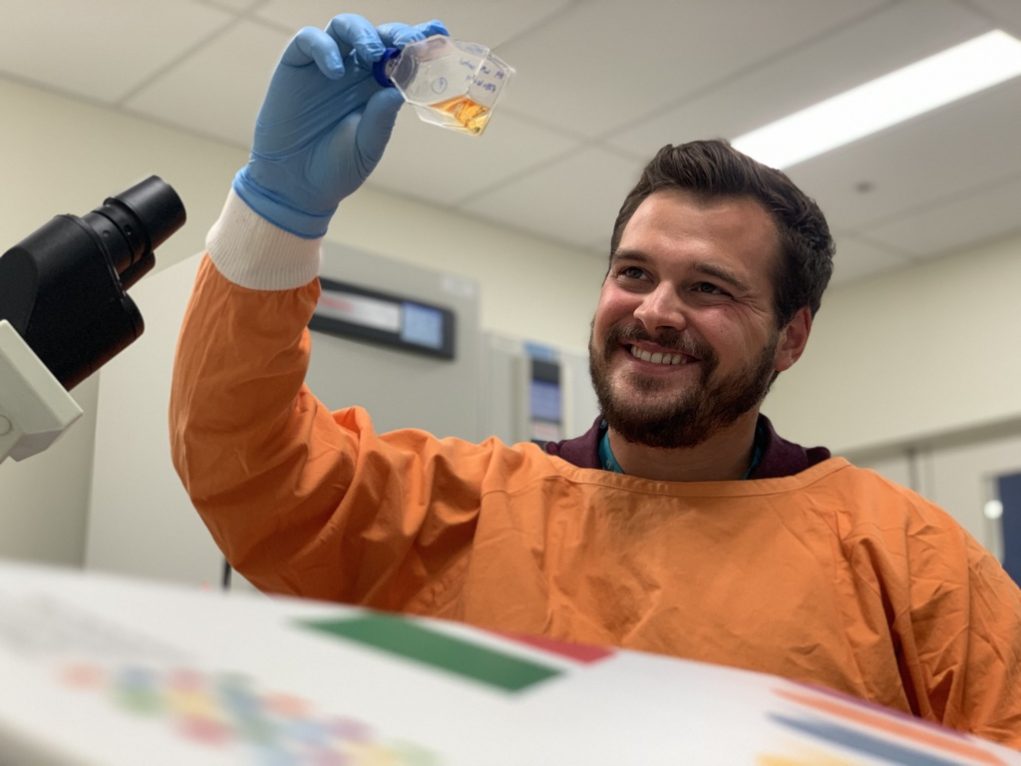 Congratulations to our runner up, Cameron McKnight, 3rd year PhD student based at the Murdoch Children’s Research Institute (MCRI) in the Brain and Mitochondrial Research group, studying under Dr Ann Frazier, Prof. David Thorburn, and Dr David Elliott.
Congratulations to our runner up, Cameron McKnight, 3rd year PhD student based at the Murdoch Children’s Research Institute (MCRI) in the Brain and Mitochondrial Research group, studying under Dr Ann Frazier, Prof. David Thorburn, and Dr David Elliott.
Cameron is using human pluripotent stem cell (hPSC) models to study mitochondrial disease, a group of complex inherited genetic disorders that affect 1 in 5000 live births by adversely impacting cellular energy generation. Despite a number of treatments showing therapeutic promise, none are currently certified for clinical use in mitochondrial disease. To address this issue, Cameron has genetically engineered a panel of hPSC models that mimic mutations known to cause mitochondrial disease in patients. Using disease relevant human heart muscle cells generated from his cell lines, Cameron is performing high-throughput drug screens with several promising compounds. This work could provide the preliminary evidence needed to support a personalised medicine approach to mitochondrial disease by linking targeted therapies to specific genetic causes.
“This award will allow me to make the most of the current situation while working from home, financing subscriptions to Adobe Cloud and BioRender as I use this time to develop some new technical skills and generate figures for my thesis. These funds will also help support my registration fees for EuroMit next year. Although the meeting has been pushed to 2021, I am excited to be able to share what will be my completed PhD work at the largest mitochondrial conference in the world!”
We would like to thank all those that participated. The next Encouragement Award will be posted on our website soon.
For more information or to stay informed of other upcoming promotions please ‘Like us” on Facebook or contact us.
Contact usAnnouncing our winner Ms Pritam Sharma recipient of our $2000 SPIN to WIN prize during ICONN2020
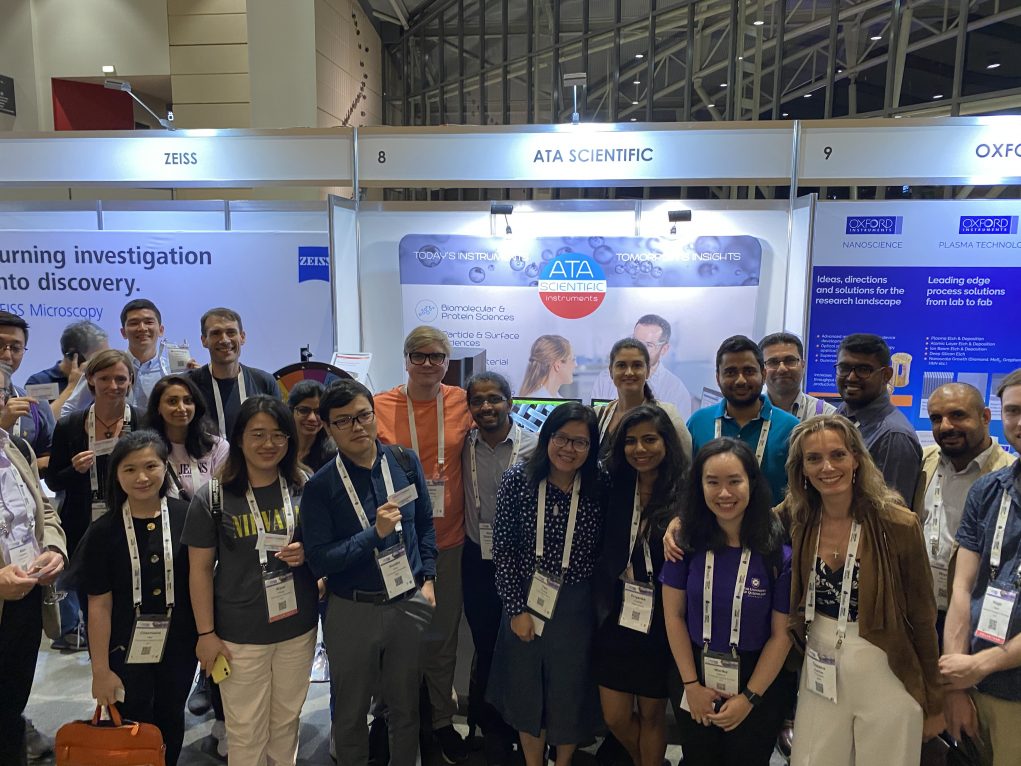 Our annual ‘SPIN TO WIN” Young Scientist competition was hosted during the 8th International Conference on Nanoscience and Nanotechnology (ICONN 2020), held at the Brisbane Convention Centre, 9-13 February 2020. Featuring a diverse array of multidisciplinary talks, the meeting connected world leading scientists, students and industry participants working in the field of nanoscale science and technology and facilitated discussions of new and exciting advances.
Our annual ‘SPIN TO WIN” Young Scientist competition was hosted during the 8th International Conference on Nanoscience and Nanotechnology (ICONN 2020), held at the Brisbane Convention Centre, 9-13 February 2020. Featuring a diverse array of multidisciplinary talks, the meeting connected world leading scientists, students and industry participants working in the field of nanoscale science and technology and facilitated discussions of new and exciting advances.
This year we invited all delegates that visited our trade booth the opportunity to participate in our spinning wheel competition. We offered a number of different prizes including timers, pens and wireless chargers, but the most appealing prize on the board, as expected, was our $2000 Young Scientist Award. The crowd’s energy intensified with anticipation after a number of participants progressed through to the final round. Cheers and gasps filled the room as everyone who had gathered supported one another until finally the winner was announced!
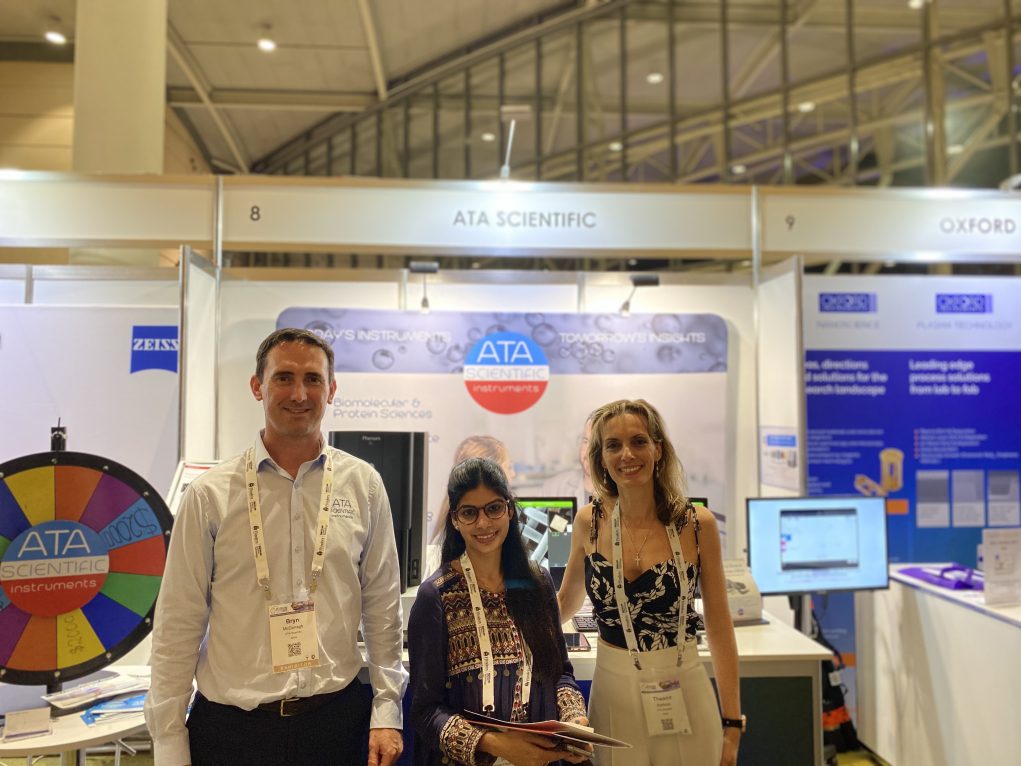 Congratulations to Ms Pritam Sharma – winner of the $2000 ‘Spin to Win’ Prize!
Congratulations to Ms Pritam Sharma – winner of the $2000 ‘Spin to Win’ Prize!
Pritam Sharma is a research student at The University of Western Australia, part of the Microelectronics research group working under the supervision of A/Prof Adrian Keating.
The group focuses on porous silicon and it’s use as a platform to create micromachined sensors. The porous nature of the films created allows the optical, electrical, thermal and mechanical properties of these films to be engineered. Current focus is on achieving a better understanding of the suitability of this material to be used in next generation thermal imaging sensors, which can be operated at room temperature. As the structural material and the release layer are all based on silicon, many of the material compatibility issues associated with multi-material systems and sensors can be avoided.
This award will help Pritam further her research training and improve dissemination of the concepts that she is currently working on.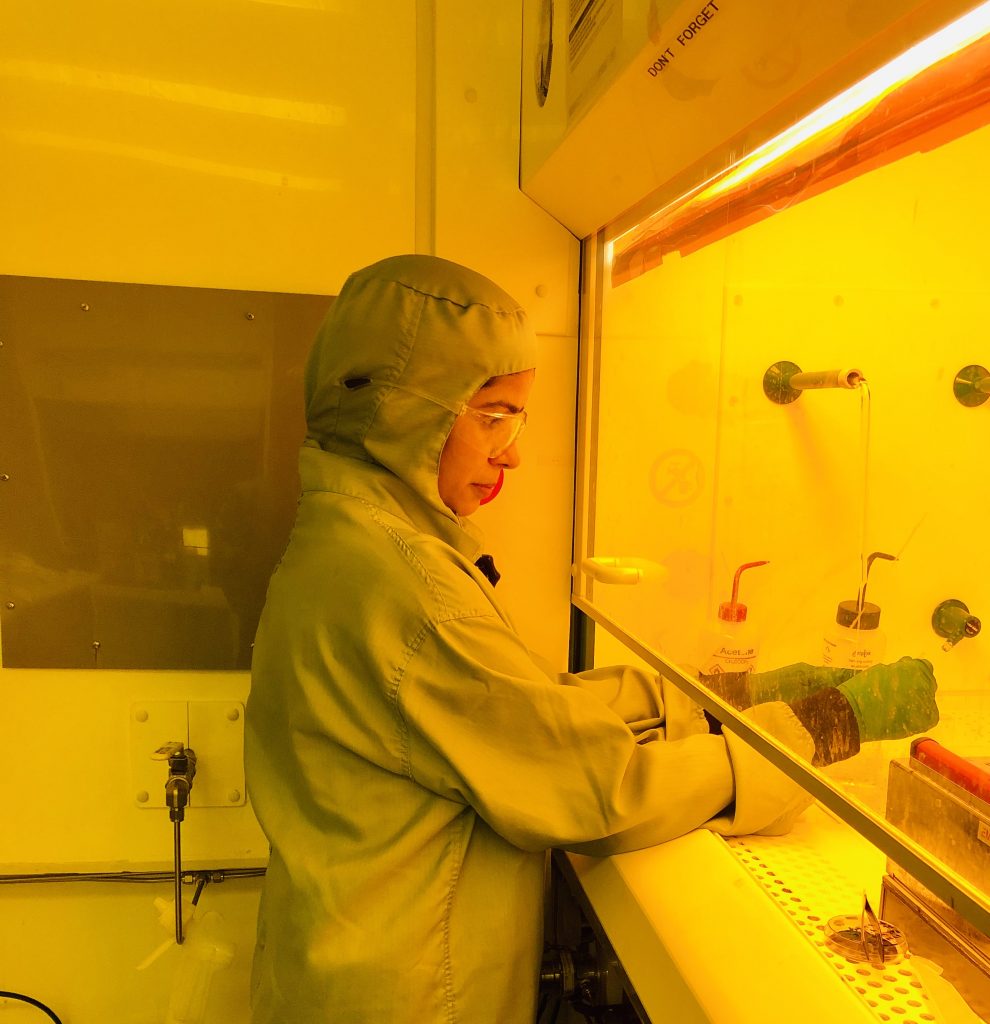
“Ultimately, getting our students and our projects better known in the research community, helps us as a group to develop a stronger reputation, which assists with drawing in high caliber students who can take the work further, and provides the potential for additional funding support” said A/Prof Adrian Keating.
This award will support Ms. Pritam Sharma to attend Prof. Sailor’s summer school for Silicon nanotechnology at UCSD to further to develop skills in the field of both nanotechnology and Porous Silicon. More than just technical skill development, this is an excellent networking opportunity for Ms. Sharma as Prof. Sailor is extremely well known in the area of porous silicon.
The SPIN to WIN award is part of the ATA Scientific Encouragement award program that started in 2011. The intent is to provide scientists access to financial assistance to enable them to collaborate with peers at scientific meetings and to launch their careers within their field of study. The awards are run at least four times a year which has so far awarded over 60 winners from multiple Universities and research organisations around Australia and New Zealand. We plan to continue posting these awards into the future and encourage all students to enter. 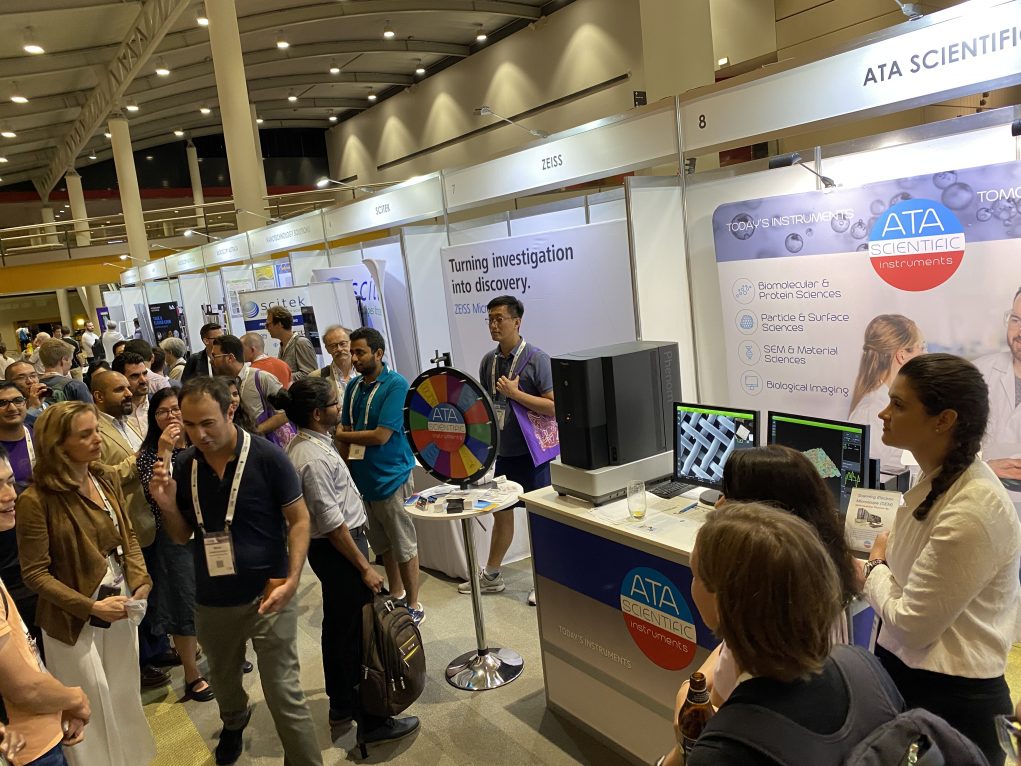
For more information regarding our award or to enter the next promotion contact us or visit our webpage at www.atascientific.com.au/awards-events-training/
Contact us
Encouragement Award October 2019
ATA Scientific would like to thank all those that participated in our Oct 2019 Encouragement Award promotion.
The topic of our latest competition focused on Dr Who, a long running BBC Sci-Fi program in which Dr Who uses a time machine called the Tardis to travel back forth in time. Participants were asked to imagine if they could travel back in time, what past scientist/engineer or moments of discovery would they choose to visit and observe and why? We were delighted to receive so many interesting responses, all of which were deserving winners. Each entry was scored based on originality, relevance and level of entertainment.
OUR WINNERS
Three entries were selected to receive our award– first prize at $1500 and 2 runners up at $600 each.

Congratulations to our first prize winner, Martha Alexandra Blank, PhD student at the St Vincent’s Institute of Medical Research, Bone Cell Biology and Disease, working under the supervision of Prof. Natalie Sims and Prof. TJ Martin.
Martha is combining her Bachelor degree in Engineering and Masters degree in Molecular Biotechnology to investigate what makes bone strong and healthy. Martha moved from Austria to Melbourne to study bone biology in one of the world’s leading laboratories for osteology. Martha is currently in the second year of her PhD project, a major aim of which is to find pathways through which bone mineralisation is initiated and regulated, and how it contributes to bone strength in healthy and disease models, to find new approaches to treat bone fragility such as eg. osteoporosis. It is critical to understand how bone mineralisation works in order to uncover new therapeutic strategies, since there are currently no effective treatments to restore a healthy skeleton.
“I will use funding provided by the ATA Scientific Encouragement Award to attend the Australian and New Zealand Bone and Mineral Society conference 2019 in Darwin to present and discuss my latest results and share them with researchers from all around the world. Especially in science, I strongly advocate communication as a powerful, yet under-rated, tool which can lead to amazing new collaborations and approaches for your own projects. It is therefore necessary to regularly attend conferences and workshops to talk to other scientists outside of your laboratory about their work and findings”.
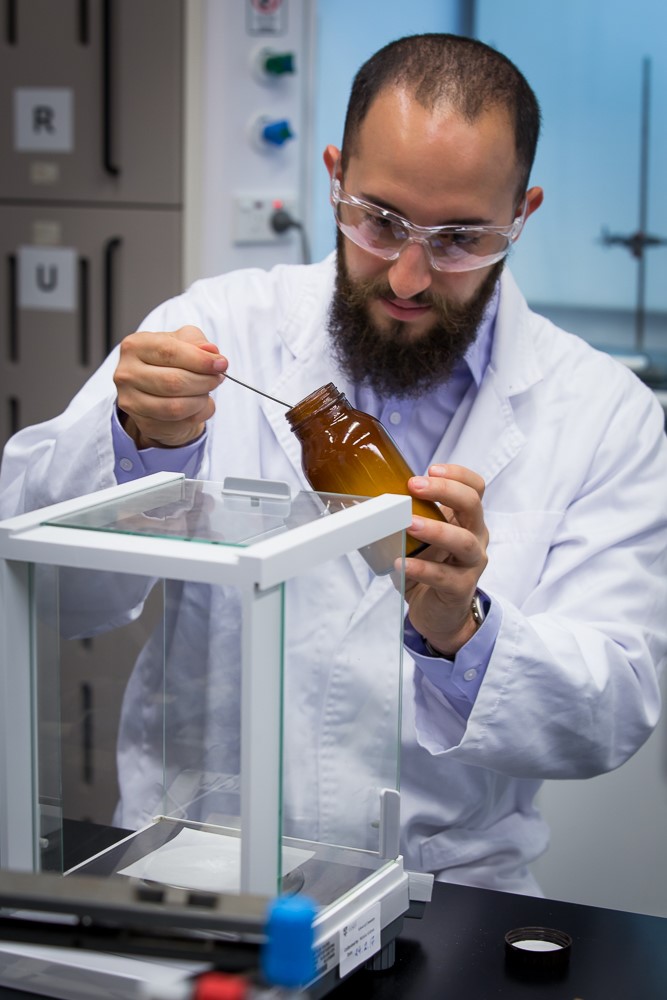
Congratulations to our runner up, Sam Peppou-Chapman, PhD candidate at University of Sydney, School of Chemistry, working under the supervision of A/Prof. Chiara Neto.
Sam’s work focusses on understanding how the many desirable properties of lubricant-infused surfaces arise and how they can be better designed for a given application. Lubricant-infused surfaces are a new class of functional surface that work by trapping a thin liquid layer on the surface. This liquid layer makes the surfaces exceptionally low adhesion and gives them application as anti-biofoiling, anti-icing and self-cleaning surfaces. By developing a novel mapping technique using Atomic Force Microscopy, Sam has been able to track the depletion of these surfaces down to the nanoscale and further understand the forces underlying the stabilisation of liquid on the surface.
Sam plans to use his award to cover costs of attending the Australian Colloid and Surface Science Student Conference (ACIS) conference in Feb 2020.
Congratulations to our runner up, Georgia Sinclair, PhD student at RMIT University, School of Chemistry, working under the supervision of A/Prof. Oliver Jones.
Georgia’s research focuses on the concern over the presence of PFAS (per- and polyfluoroalkyl substances) in ecosystems and the lack of knowledge of the dosage needed to have an adverse effect. The significance of her research will contribute to conclusive biochemical information surrounding the toxicity of PFAS for the world to benefit. Metabolomics is the study of hundreds and thousands of small molecules in all living things such as carbohydrates and amino acids. Her project will employ a metabolomics approach to identify the biochemical pathways affected by a range of PFAS concentrations in model organisms.

Georgia would like to use her award to contribute towards attending the 8th World Congress of the Society for Environmental Toxicology and Chemistry (SETAC) which will be held in Singapore in 2020. The conference will allow Georgia to be exposed to the latest developments in metabolomic and ecotoxicology research and gain valuable experience presenting and communicating my work.
“Ecotoxicology is an area of science that I am very passionate about and want to follow as a career. I would like to contribute to the development of national and international chemical guidelines, either through academia or as a principle scientist in industry”.
We would like to thank all those that participated. The next Encouragement Award is now available to enter here. Entries close 31 March 2020.
For more information or to stay informed of other upcoming promotions please ‘Like us” on Facebook or contact us.
Contact usENCOURAGEMENT AWARD JUNE 2019
ATA Scientific would like to thank all those that participated in our June 2019 Encouragement Award promotion.
The topic of our latest competition focused The Museum of Failure located in Sweden which home to a collection of failed products and services from around the world. The museum showcases these failures (e.g Google’s glasses, Sony’s Betamax, Apple’s Newton Messagepad, BIC for her pens and Trump’s monopoly game) to provide a learning experience and a unique insight into the risky business of innovation. We asked our audience to consider other examples of failures that could possibly be included in this Museum and some of the lessons that we could learn from such an apparent failure.
Once again, we were delighted to receive so many high quality responses, all of which were deserving winners. Each entry was scored based on originality, relevance and level of entertainment.
OUR WINNERS
Three entries were selected to receive our award– first prize at $1500 and 2 runners up at $600 each.

Congratulations to our first prize winner, Stefan Mueller, PhD student at the University of Wollongong, School of Chemistry and Molecular Bioscience, working under the supervision of Distinguished Professor Antoine Van Oijen.
After finishing his B.Sc. degree in Physics, with a research project on the production of ultra-cold neutrons at the Technical University of Munich, Germany, Stefan decided to shift his interests from pure physics to biology. Driven by his curiosity about how life is actually physically possible, he decided to travel to Australia and join Antoine Van Oijen’s lab, where the team applies physical methods to study biological systems. Stefan’s project focuses on DNA replication, the process of copying the genome prior to cell division. This process is vital for every living organism, defects in this process are associated to a number of diseases, including numerous genetic disorders and cancer. By applying single-molecule microscopy Stefan can visualise DNA replication in vitro, one molecule at a time. He is particularly interested in how UV-damage of the genomes can affect this process on the molecular scale.
“The strong urge to understand the fundamental mechanisms of life, but also the belief that such an understanding will eventually lead to new therapies for diseases is why I want to pursue an academic career. The ATA Scientific Encouragement Award provides me funding that I will use to take part in the Cold Spring Harbor Meeting on Eukaryotic DNA Replication & Genome Maintenance this September in New York, and present my work to renowned researchers of my field”.
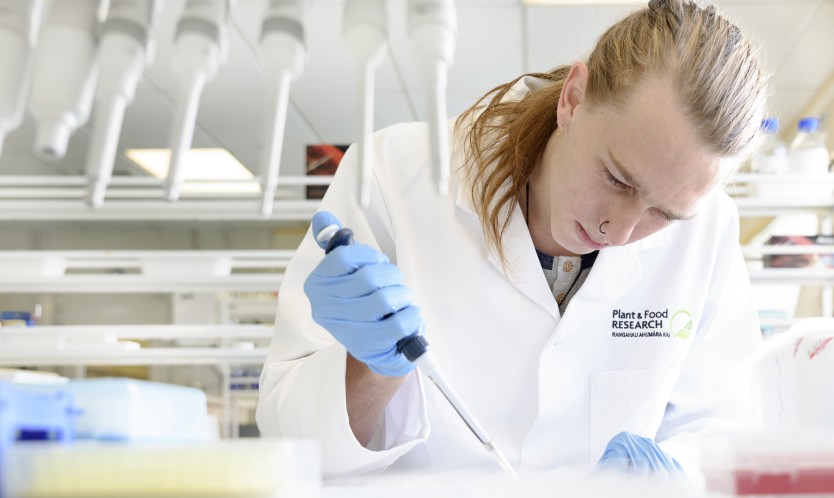
Congratulations to our runner up, Nikolai Macnee, PhD candidate at University of Auckland & Plant and Food Research, working under the supervision of Dr Robert Schaffer and Dr Sean Bulley.
Nikolai is completing his PhD studies on the molecular mechanisms that govern fruit skin formation in kiwifruit. Nikolai is currently approaching the end of his PhD and soon will start a new job which will enable him to continue his developmental plant biology research in the field of medicinal cannabis. Nikolai uses command line programming to assist in data analysis relevant to plant development but would like to expand his abilities into horticultural biotechnology. Nikolai would like to use his award to assist with a personal project aimed at robotic plant growth systems. Although his skills focus on molecular plant biology, he is keen to investigate future growing systems and the production of low-cost robots for growing plants, ideally with the implementation of AI for monitoring.
“It would be a dream to have the funds to prototype my robots, and one day enable others to grow food for themselves even while living busy lives”.
Congratulations to our runner up, Lakshanie Wickramasinghe, PhD student at Monash University, Department of Immunology and Pathology, working under the supervision of Associate Professor Margaret Hibbs.
Her research is focused on understanding the immune mechanisms underlying the development of a severe, yet common lung disease that affects preterm babies known as Bronchopulmonary Dysplasia (BPD). Of particular interest is understanding how it begins in the early neonatal period and how it can lead to long-term damage to vital organs such as the lungs. Lakshanie aspires to become more involved in exploring therapeutics that can reduce, or ultimately prevent premature infants from developing BPD. Lakshanie hopes to be able to use her immunological and scientific knowledge to better understand the mechanisms of action of these therapeutics in the body. Along with this, Lakshanie also hopes to help improve maternal and neonatal healthcare in Asian and African countries where mortality rates for preterm infants are unacceptably high. Often this is due to limited access to resources and rapid management strategies that can improve preterm birth outcomes. This kind of care is essential to all mothers and babies, and Lakshanie hopes to be a part of the process of making essential pre- and postnatal care more accessible worldwide.
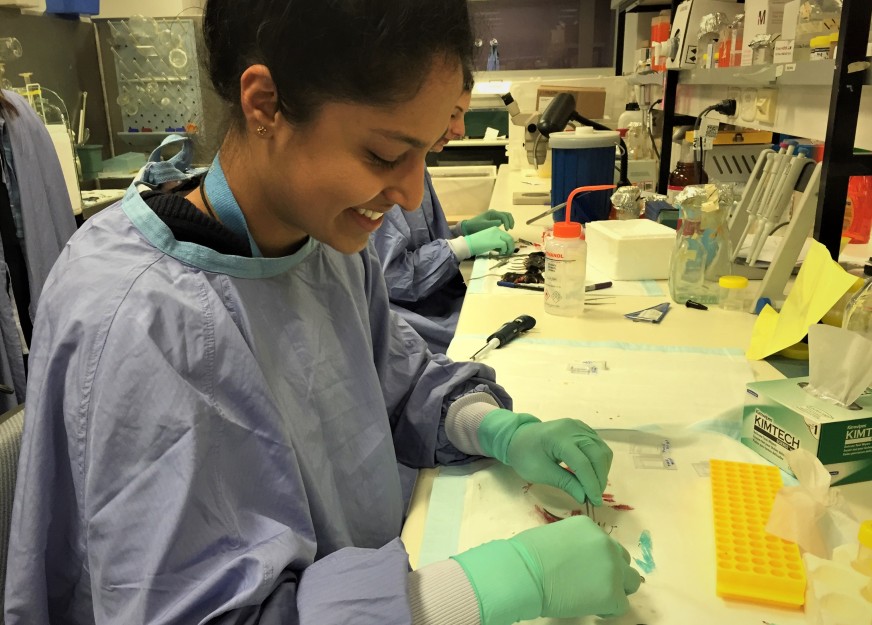 Lakshanie will be using her award to contribute to the cost of registration and attendance for the Fetal and Neonatal Physiological Society conference, 16 – 19th October 2019 in Marysville, Victoria.
Lakshanie will be using her award to contribute to the cost of registration and attendance for the Fetal and Neonatal Physiological Society conference, 16 – 19th October 2019 in Marysville, Victoria.
“By attending this conference it will give me to opportunity to hear about current research being undertaken by scientists in the field around the world. It will also give me the opportunity to share my own research with others which may lead to fantastic collaborations in the future”.
We would like to thank all those that participated. The next Encouragement Award will be posted on our website here.
For more information or to stay informed of other upcoming promotions please ‘Like us” on Facebook or contact us.
Contact us
ENCOURAGEMENT AWARD NOVEMBER 2018
ATA Scientific would like to thank all those that participated in our Oct-Nov 2018 Encouragement Award promotion.
The topic of our latest competition focused on the possible existence of a highly advanced extra-terrestrial civilisation observing us on earth and whether they should impose on us a fair and sustainable civilisation or keep well away. While Hollywood might have led us to think that an alien encounter would be greeted with guns and missiles, many of our applicants felt that in reality we humans would act in a far more positive manner. In fact a new study has supported this view and proposed “if we find out we’re not alone, we’ll take the news rather well”. Ultimately the mere fact that we’ve endeavoured to send a record of our presence into space (NASA’s Golden record launched in 1977) shows something about our humanity.
Once again, we were delighted to receive so many high quality responses, all of which were deserving winners. Each entry was scored based on originality, relevance and level of entertainment.
OUR WINNERS
Three entries were selected to receive our award– first prize at $1500 and 2 runners up at $600 each.
Congratulations to our first prize winner, Miss Caroline Holley, second year PhD student at the Institute of Molecular Bioscience, University of Queensland working under the supervision of Associate Professor Kate Schroder.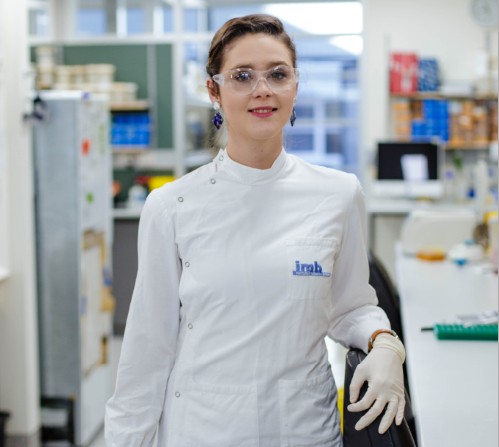 “Being curious about the natural sciences from an early age, it was inevitable that I would eventually end up in research. I became fascinated with how our bodies defend themselves against pathogenic infection and joined A/Prof. Kate Schroder’s lab to develop my knowledge in this area”.
“Being curious about the natural sciences from an early age, it was inevitable that I would eventually end up in research. I became fascinated with how our bodies defend themselves against pathogenic infection and joined A/Prof. Kate Schroder’s lab to develop my knowledge in this area”.
Caroline’s project is focused on the inflammasome, which is the major driver of many neuro-inflammatory diseases (e.g. Alzheimer’s and Parkinson’s disease). Research in this area is becoming increasingly important given our aging population and an increase in lifestyle-related disease across the world (such as neurodegeneration, diabetes and persistent pathogenic infections). Current therapeutics for these diseases focus on stabilising the cognitive symptoms, but do not prevent further neuronal damage. The aim of Caroline’s project is to elucidate the role of mitochondria in inflammasome signalling, and use this knowledge to control inflammation in mouse models of neuro-inflammation. Eventually Caroline hopes to apply her research to patients living with chronic inflammatory diseases.
In addition to her PhD lab work, Caroline is an active member of her student society’s executive, and has coordinated several career development and social events for her fellow PhD students this year.
Caroline plans to use her award to present her research at the Lorne Infection & Immunology Conference in Melbourne (http://www.lorneinfectionimmunity.org) and the ASI Annual Scientific Meeting in Adelaide (http://www.immunology.org.au) next year.
“These conferences attract many domestic and international immunology heavyweights, and I’m so excited to broaden my network and collaborations. This will undoubtedly be invaluable for my post-PhD prospects, as I hope to secure a postdoctoral position in Germany after my thesis is accepted”.
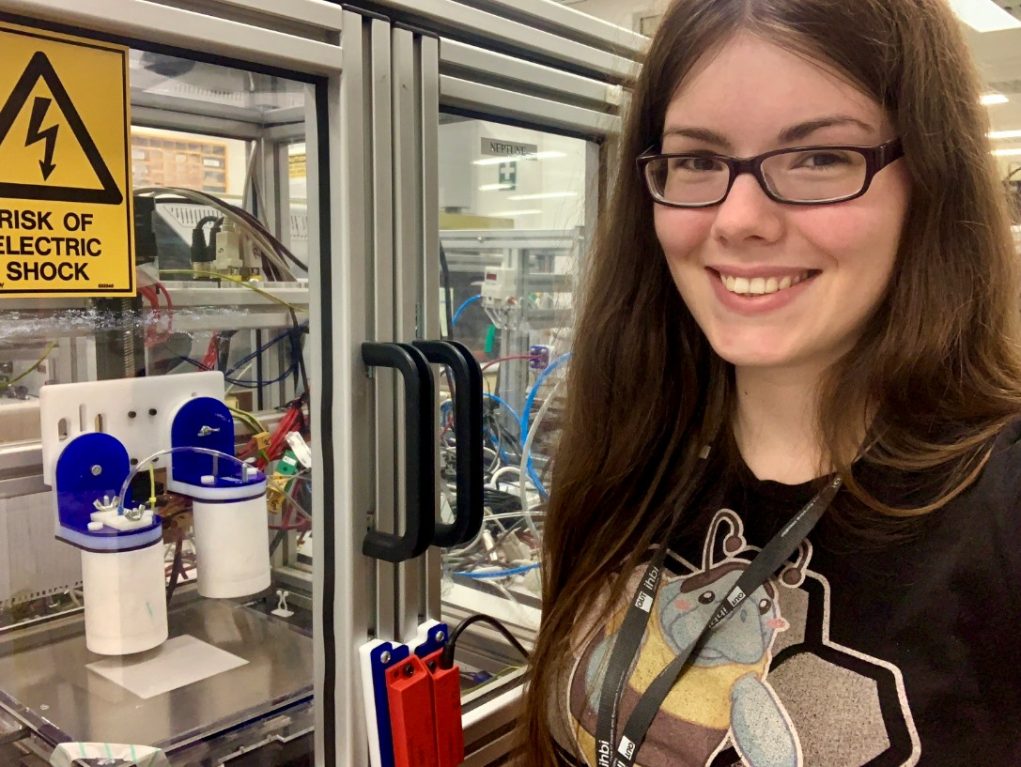
Congratulations to our runner up, Ms Sabrina Schönborn, international Master student at the Institute of Health and Biomedical Innovation, Queensland University of Technology, working under the supervision of Dr Elena M. De-Juan-Pardo.
Sabrina is originally from RWTH Aachen, Germany and currently working at IHBI in the Regenerative Medicine Group as part of her Master Thesis. The team that Sabrina works with is attempting to develop a tissue engineered heart valve replacement using Melt Electrospinning Writing (MEW). In the photo attached Sabrina is standing next to one of the MEW machines in her lab being used to develop the new heart valve. Sabrina’s project is mainly focused on creating a scaffold for a replacement of the aortic root which encloses the aortic valve. Following her graduation, Sabrina would like to continue her career in research and development working with medical products, preferably implants.
Sabrina plans to use the prize money to attend the Australia-China Conference of Tissue Engineering and Regenerative Medicine (ACCTERM), November 22-24, 2018 being held in Cairns this year.
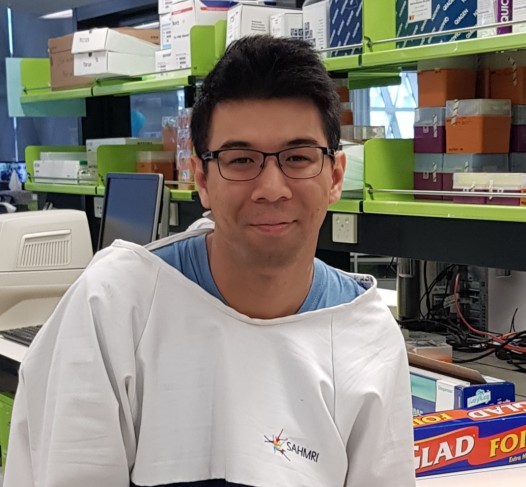 Congratulations to our runner up, Mr Terence Tieu. Terence is a joint PhD candidate between Monash University and CSIRO, working under the supervision of Dr Anna Cifuentes-Rius, Dr Helmut Thissen and Prof. Nico Voelcker.
Congratulations to our runner up, Mr Terence Tieu. Terence is a joint PhD candidate between Monash University and CSIRO, working under the supervision of Dr Anna Cifuentes-Rius, Dr Helmut Thissen and Prof. Nico Voelcker.
His research is focused on the development of Nano carriers, namely, porous silicon nanoparticles for efficient delivery of oligonucleotides.
The award will be used to contribute towards the costs of attending the Controlled Release Society conference in Valencia, Spain next year where he aims to share his research with an international audience.”
We would like to thank all those that participated. The next Encouragement Award will be posted on our website early 2019.
For more information or to stay informed of other upcoming promotions please Follow us on Facebook or contact us.
Contact usENCOURAGEMENT AWARD AUGUST 2018
ATA Scientific would like to thank all those that participated in our recent Encouragement Award promotion.
The topic of our latest competition focused on the strong link between cognitive behaviour and foods. While studies continue to show evidence that supports the idea that food can influence our thought processes, we asked our readers to consider their own experiences and whether particular foods had any influence on their ability to think and concentrate. Judging by the number of entries received this is certainly a hot topic, particularly for those addicted to coffee and chocolate – yes, you know who you are. Many chose to focus on the science of consuming certain foods and described the chemical pathways leading to changes in brain function. Others noted the social impact and the role food plays in the expression of cultural identity. We were delighted to receive so many high quality responses, all of which were deserving winners. Each entry was scored based on originality, relevance and level of entertainment.
OUR WINNERS
After much deliberation, three entries were selected to receive our award– first prize at $1500 and 2 runners up at $600 each.
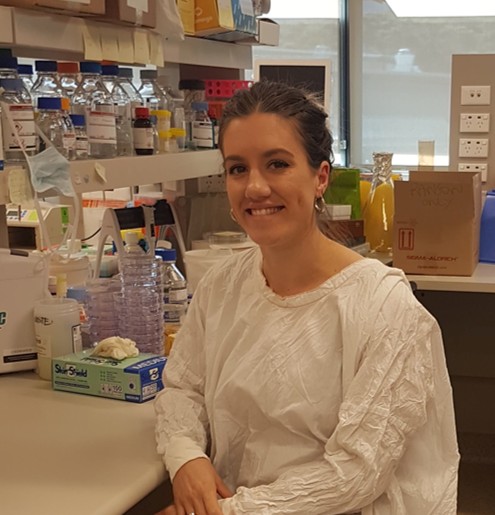 Congratulations to our first prize winner Samantha Wade, PhD candidate at the Targeted Cancer Therapeutics Laboratory, Illawarra Health and Medical Research Institute, University Of Wollongong, working under the supervision of Dr Kara L. Vine-Perrow.
Congratulations to our first prize winner Samantha Wade, PhD candidate at the Targeted Cancer Therapeutics Laboratory, Illawarra Health and Medical Research Institute, University Of Wollongong, working under the supervision of Dr Kara L. Vine-Perrow.
Samantha is a third year PhD student working on implantable drug delivery for pancreatic cancer. Her work involves re-purposing FDA approved materials and clinically used drugs to make dual drug eluting structures for implantation and local release in pancreatic tumours. Samantha works with a team of clinicians, material engineers and biologists to cover all aspects of the project, to fabricate implants that are targeted toward clinical use.
For Pancreatic cancer, systemic chemotherapy has been found to be largely ineffective and surgery is not an option for many people because most cases are diagnosed after the cancer has spread to other parts of the body. Samantha’s work on drug-loaded implants may offer patients a better chance of survival as they can be placed directly into the tumour to shrink it down to a size that can be surgically removed.
Samantha plans to use the award money to help cover the costs of attending the controlled release society annual meeting in Spain next year.
Congratulations to our runner up, Cameron McKnight.
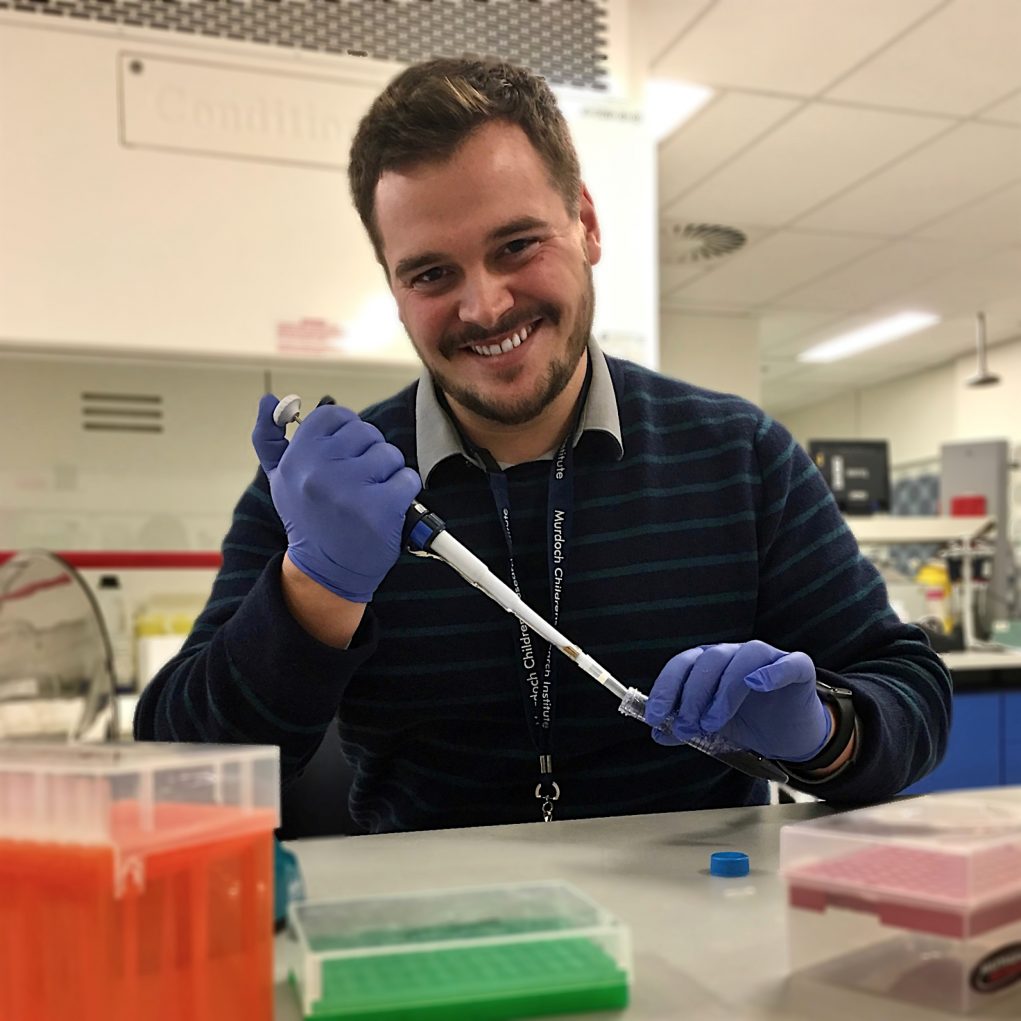
Cameron McKnight is a PhD student based at the Murdoch Children’s Research Institute (MCRI) in the lab of Prof. David Thorburn. His degree is through paediatrics at the University of Melbourne and he is supported by a Melbourne Research Scholarship. Cameron is also President of the Melbourne Children’s Campus Research Student Association and works with a group of volunteer students to organise networking and educational opportunities for all students studying on the children’s campus.
Working with his supervisor Ann Frazier, Cameron’s research focuses on childhood forms of mitochondrial disease, a group of complex inherited genetic disorders that primarily affect cellular energy production. He is developing pluripotent stem cell models to facilitate preclinical treatment studies and investigation of the underlying cellular mechanisms of disease. Although mitochondrial disease affects approximately 1 in 5000 live births, there is currently no known cures or treatments, a result of the clinical and genetic heterogeneity of the disorders. Still, a number of agents show therapeutic promise. The ultimate goal of Cameron’s project is to identify a potential treatment option using the clinically affected cell types by generating them in culture from his pluripotent stem cell models.
“This award will allow me to present my research at two discipline specific conferences this year, Australian Functional Genomics Conference in September and AussieMit in November, providing me the opportunity to get some valuable input from experts in fields. These conferences are also a great chance to network and potentially foster collaborations that could take my project to the next level! Post PhD, I hope to find a postdoctoral fellowship in stem cell or mitochondrial research. Having already moved from Canada I hope to be able to remain in Melbourne, but I am open to moving across the globe again short-term in order to develop some important long-term connections”.
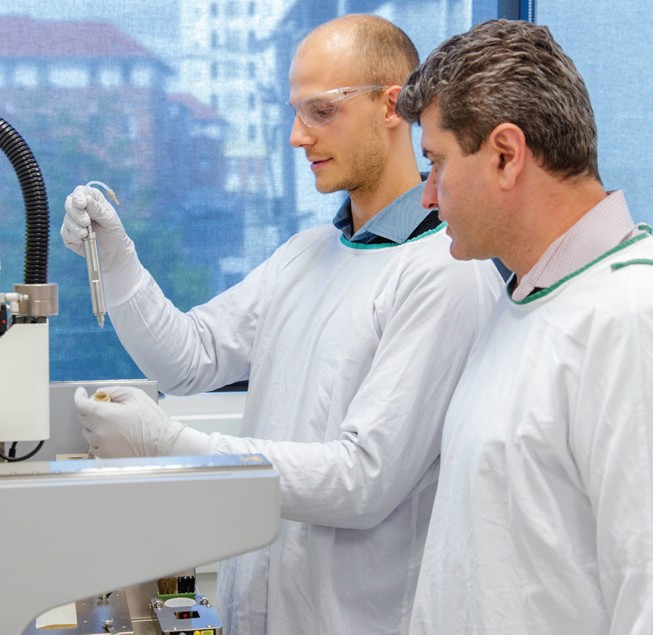 Congratulations to our runner up, Dr Michal Bartnikowski, a Postdoctoral Research Fellow from the School of Dentistry, at The University of Queensland. Michal is currently working with supervisor Professor Sašo Ivanovski on the development of 3D printed scaffolds for bone and periodontal regeneration.
Congratulations to our runner up, Dr Michal Bartnikowski, a Postdoctoral Research Fellow from the School of Dentistry, at The University of Queensland. Michal is currently working with supervisor Professor Sašo Ivanovski on the development of 3D printed scaffolds for bone and periodontal regeneration.
Michal’s work focuses on the development and clinical translation of custom biodegradable tissue engineered scaffold implants for bone regeneration of orofacial defects. These implants are made to fit individual patient’s geometries, and form a supportive structure to help the growth and development of bony tissue. Over the next few years, Michal aims to take a suite of tissue engineering products to the market, delivering affordable custom tissue regeneration solutions to patients in Australia.
Michal will use this award to help fund his trip to Kyoto, Japan this year, where he will present some of his work at the Tissue Engineering and Regenerative Medicine International Society (TERMIS) World Congress 2018 conference.
We would like to thank all those that participated. The final Encouragement Award for 2018 will be posted on our website soon.
For more information or to stay informed of other upcoming promotions please ‘Like us” on Facebook or contact us.
Contact us



 02 9541 3500
02 9541 3500